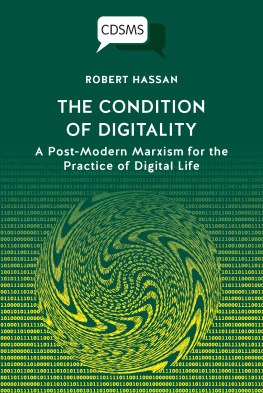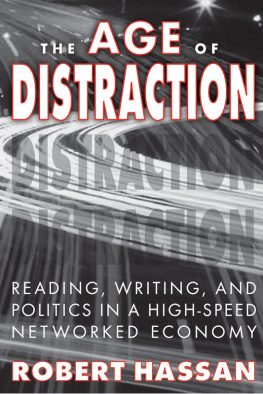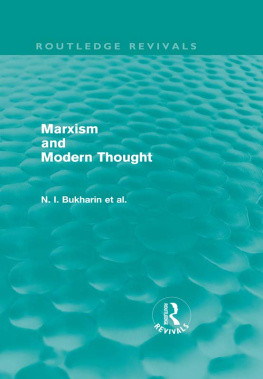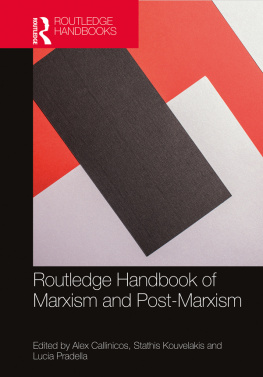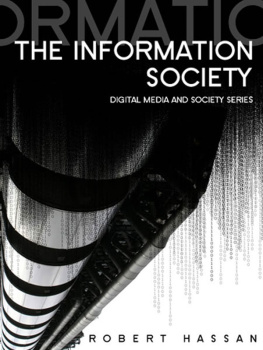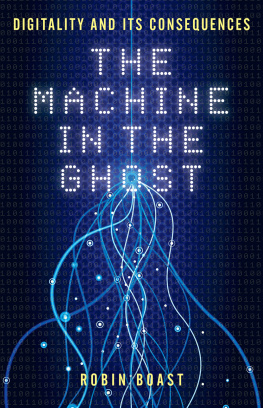Robert Hassan - The Condition of Digitality: A Post-Modern Marxism for the Practice of Digital Life
Here you can read online Robert Hassan - The Condition of Digitality: A Post-Modern Marxism for the Practice of Digital Life full text of the book (entire story) in english for free. Download pdf and epub, get meaning, cover and reviews about this ebook. City: London, year: 2020, publisher: University of Westminster Press, genre: Politics. Description of the work, (preface) as well as reviews are available. Best literature library LitArk.com created for fans of good reading and offers a wide selection of genres:
Romance novel
Science fiction
Adventure
Detective
Science
History
Home and family
Prose
Art
Politics
Computer
Non-fiction
Religion
Business
Children
Humor
Choose a favorite category and find really read worthwhile books. Enjoy immersion in the world of imagination, feel the emotions of the characters or learn something new for yourself, make an fascinating discovery.
- Book:The Condition of Digitality: A Post-Modern Marxism for the Practice of Digital Life
- Author:
- Publisher:University of Westminster Press
- Genre:
- Year:2020
- City:London
- Rating:5 / 5
- Favourites:Add to favourites
- Your mark:
- 100
- 1
- 2
- 3
- 4
- 5
The Condition of Digitality: A Post-Modern Marxism for the Practice of Digital Life: summary, description and annotation
We offer to read an annotation, description, summary or preface (depends on what the author of the book "The Condition of Digitality: A Post-Modern Marxism for the Practice of Digital Life" wrote himself). If you haven't found the necessary information about the book — write in the comments, we will try to find it.
Robert Hassan: author's other books
Who wrote The Condition of Digitality: A Post-Modern Marxism for the Practice of Digital Life? Find out the surname, the name of the author of the book and a list of all author's works by series.
The Condition of Digitality: A Post-Modern Marxism for the Practice of Digital Life — read online for free the complete book (whole text) full work
Below is the text of the book, divided by pages. System saving the place of the last page read, allows you to conveniently read the book "The Condition of Digitality: A Post-Modern Marxism for the Practice of Digital Life" online for free, without having to search again every time where you left off. Put a bookmark, and you can go to the page where you finished reading at any time.
Font size:
Interval:
Bookmark:
The Condition
of Digitality:
A Post-Modern
Marxism for the
Practice of Digital Life
Robert Hassan
Critical, Digital and Social Media Studies
Series Editor: Christian Fuchs
The peer-reviewed book series edited by Christian Fuchs publishes books that critically study the role of the internet and digital and social media in society. Titles analyse how power structures, digital capitalism, ideology and social struggles shape and are shaped by digital and social media. They use and develop critical theory discussing the political relevance and implications of studied topics. The series is a theoretical forum for internet and social media research for books using methods and theories that challenge digital positivism; it also seeks to explore digital media ethics grounded in critical social theories and philosophy.
Editorial Board
Thomas Allmer, Mark Andrejevic, Miriyam Aouragh, Charles Brown, Eran Fisher, Peter Goodwin, Jonathan Hardy, Kylie Jarrett, Anastasia Kavada, Maria Michalis, Stefania Milan, Vincent Mosco, Jack Qiu, Jernej Amon Prodnik, Marisol Sandoval, Sebastian Sevignani, Pieter Verdegem
Published
Critical Theory of Communication: New Readings of Lukcs, Adorno, Marcuse, Honneth and Habermas in the Age of the Internet
Christian Fuchs
https://doi.org/10.16997/book1
Knowledge in the Age of Digital Capitalism: An Introduction to Cognitive Materialism
Mariano Zukerfeld
https://doi.org/10.16997/book3
Politicizing Digital Space: Theory, the Internet, and Renewing Democracy
Trevor Garrison Smith
https://doi.org/10.16997/book5
Capital, State, Empire: The New American Way of Digital Warfare
Scott Timcke
https://doi.org/10.16997/book6
The Spectacle 2.0: Reading Debord in the Context of Digital Capitalism
Edited by Marco Briziarelli and Emiliana Armano
https://doi.org/10.16997/book11
The Big Data Agenda: Data Ethics and Critical Data Studies
Annika Richterich
https://doi.org/10.16997/book14
Social Capital Online: Alienation and Accumulation
Kane X. Faucher
https://doi.org/10.16997/book16
The Propaganda Model Today: Filtering Perception and Awareness
Edited by Joan Pedro-Caraana, Daniel Broudy and Jeffery Klaehn
https://doi.org/10.16997/book27
Critical Theory and Authoritarian Populism
Edited by Jeremiah Morelock
https://doi.org/10.16997/book30
Peer to Peer: The Commons Manifesto
Michel Bauwens, Vasilis Kostakis, and Alex Pazaitis
https://doi.org/10.16997/book33
Bubbles and Machines: Gender, Information and Financial Crises
Micky Lee
https://doi.org/10.16997/book34
Cultural Crowdfunding: Platform Capitalism, Labour and Globalization
Edited by Vincent Rouz
https://doi.org/10.16997/book38
The Condition
of Digitality:
A Post-Modern Marxism for the
Practice of Digital Life
Robert Hassan

University of Westminster Press
www.uwestminsterpress.co.uk
Published by
University of Westminster Press
115 New Cavendish Street
London W1W 6UW
www.uwestminsterpress.co.uk
Text Robert Hassan 2020
First published 2020
Cover design: www.ketchup-productions.co.uk
Series cover concept: Mina Bach (minabach.co.uk)
Print and digital versions typeset by Siliconchips Services Ltd.
ISBN (Paperback): 978-1-912656-67-7
ISBN (PDF): 978-1-912656-68-4
ISBN (EPUB): 978-1-912656-69-1
ISBN (Kindle): 978-1-912656-70-7
DOI: https://doi.org/10.16997/book44
This work is licensed under the Creative Commons Attribution-NonCommercial-NoDerivatives 4.0 International License. To view a copy of this license, visit http://creativecommons.org/licenses/by-nc-nd/4.0/ or send a letter to Creative Commons, 444 Castro Street, Suite 900, Mountain View, California, 94041, USA. This license allows for copying and distributing the work, providing author attribution is clearly stated, that you are not using the material for commercial purposes, and that modified versions are not distributed.
The full text of this book has been peer-reviewed to ensure high academic standards. For full review policies, see: http://www.uwestminsterpress.co.uk/site/publish. Competing interests: The authors have no competing interests to declare.
Suggested citation:
Hassan, R. 2020. The Condition of Digitality: A Post-Modern Marxism for the Practice of Digital Life . London: University of Westminster Press. DOI: https://doi.org/10.16997/book44 License: CC-BY-NC-ND 4.0
To read the free, open access version of this book online, visit https://doi.org/10.16997/book44 or scan this QR code with your mobile device:

Acknowledgements
My gratitude, first of all, goes to Christian Fuchs for encouraging me to continue with the manuscript through its two or three iterations and which saw it transform quite considerably from the initial idea that I had pitched to him. Thanks also to the anonymous reviewers who, mixing antagonism and sympathy between them, were actually helpful in improving the text. Special thanks to Andrew Lockett, whom I met in Melbourne over a beer to discuss the broad themes of a yet-to-be-written manuscript. His quiet encouragement and no-stress approach to deadlines nonetheless acted as a speed-up as actual deadlines loomed.
Family, as always, is central to my functioning in any realm, and so it was here. Without Kate, Theo and Camille Id likely be tramping the streets, muttering to myself and looking for a place to sleep.
In the text I use both postmodernity (postmodernism) and post-modernity to signify two different meanings. Postmodernism used to convey an ideological frame as it has been used in many left and Marxist critical writings since at least the late-1970s. Post-modernity I see as a much stronger and more epochal signifier, indicating a phase in historical, economic and philosophical time that has moved definitively beyond modernity ; a modernity which, following Jean-Franois Lyotard, was the imposed Enlightenment idea of a unitary history and subject. An idea and a time that has gone.
For Josie Daw and Mark Hassan
CHAPTER 1
A world that has changed, but has not changed.
If the title of this book vaguely recalls another, then to save you guessing Ill state at once that this is a book that is part homage and part critical re-consideration of David Harveys The Condition of Postmodernity : An Inquiry into the Origins of Cultural Change suffused the consciousness of almost every person within it in terms of his or her engagement with each other through networks of communication, production and consumption: I call it digitality.
But first to Harvey.
Postmodernity is an academic text but, unusually for such a work, it has been through several reprints. Even more remarkable, it crossed over into the mainstream and was reviewed in supplements, magazines and newspapers in the early 1990s. And, perhaps unprecedentedlyconsidering it was an overtly Marxist workthe Financial Times reviewer hailed it as probably the best [book] yet written on the link between ... economic and cultural transformations. That was then. So what? Beyond the fact that I write these words in 2019, and a minor anniversarial moment attends to its first print-run, the more serious questions a reader would ask are: why Harvey, why this particular book, and why now? Before coming to these, I should preface my answers by saying that Harvey, his book, and the present conjunction are subsets of the overarching questions that scale to the wider context that this book is aboutthe relevance of Marxism and internationalism today in an era of insurgent right-wing populism and ethnic nationalism; the condition of capitalism today when it seems more chronically ailing than ever, yet we increasingly feel unable to see beyond it; and, as I just noted, our understanding of digital technology, which since the time of the publication of Postmodernity has become a condition all of its own, a process that has become so embedded and so normative (so quickly) that we have failed to see what it has done to the operation of capital and to the relevance of the basic materialist ideas of Marxism.
Font size:
Interval:
Bookmark:
Similar books «The Condition of Digitality: A Post-Modern Marxism for the Practice of Digital Life»
Look at similar books to The Condition of Digitality: A Post-Modern Marxism for the Practice of Digital Life. We have selected literature similar in name and meaning in the hope of providing readers with more options to find new, interesting, not yet read works.
Discussion, reviews of the book The Condition of Digitality: A Post-Modern Marxism for the Practice of Digital Life and just readers' own opinions. Leave your comments, write what you think about the work, its meaning or the main characters. Specify what exactly you liked and what you didn't like, and why you think so.

